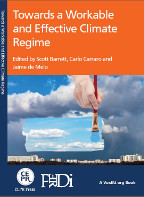Towards a Workable and Effective Climate Regime

10.11.2015
Scott Barrett, Carlo Carraro and Jaime de Melo
CEPR and FERDI e-book
Publication of this eBook, incorporating 35 separate chapters, was timed
to coincide with the 21st Conference of the Parties to the United
Nations Framework Convention on Climate Change. As negotiators prepare
for Paris, hopes are running high that a new climate agreement will be
adopted. But these hopes are tempered by historical experience. For the
past 25 years, countries have tried, and failed, to come up with a
cooperative arrangement capable of putting the world on a path to limit
climate change.
Will Paris be any different? It is too soon to tell, but it seems that
Paris will at least provide a foundation upon which the world can build
effective action. The new Paris Agreement – assuming one is adopted –
will likely reaffirm the global goal of limiting climate change. It will
probably create a platform for revealing the actions and targets that
countries have pledged to undertake voluntarily. And it will likely
track progress towards meeting the collective goal.
The big question is what all of this will add up to. As argued in this
eBook, whether Paris ultimately succeeds will depend on whether it gets
countries to establish an explicit or implicit carbon price, whether it
supports a massive increase in energy R&D, whether it finances a
transformation in the world’s energy system, and whether it helps the
world’s most vulnerable countries and peoples to adapt. If Paris
succeeds, 25 years from now, global emissions should be a lot lower than
today, and trending further downwards.
Contributors: AKIMOTO Keigo; ALDY Joseph E.; ANGELSEN
Arild; BANGALORE Mook; BARRETT Scott; BHASIN Shikha; BIGIO Anthony G.;
BODANSKY Daniel; BOSETTI Valentina; BONZANIGO Laura; BUCHNER Barbara;
BURTRAW Dallas; CARRARO Carlo; COLLIER Paul; de CONINCK Heleen; de MELO
Jaime; EDENHOFER Ottmar; FAY Marianne; FEI Teng; FISCHER Carolyn;
FLANNERY Brian P.; GUESNERIE Roger; GUILLAUMONT Patrick; HALLEGATE
Stephane; HOURCADE Jean-Charles ; KADNER Susanne; KANE Tamaro; KAUDIA
Alice; KEOHANE Robert O.; KÖHLIN Gunnar; KOTCHEN Matthew J.; MASSETTI
Emanuele; MAVROIDIS Petros C.; MEKONNEN Alemu; MORENO-CRUZ Juan; MINX
Jan Christoph; MURISIC Maja; NARLOCH Ulf; OPPENHEIMER Michael; PIZER
William A.; ROZENBERG Julie; RUDYCK Bryce; SOMANATHAN Eswaran; STAVINS
Robert N.; VON STECHOW Christoph; STERNER Thomas; STEWART Richard B.;
STOCKER Thomas F.; TAVONI Massimo; TOMAN Michael; TREGUER David; VICTOR
David G.; VOGT-SCHILB Adrien; WANG Xueman; WIENER Jonathan B.; WILKINSON
Jane; YAMAGUCHI Mitsutsune
Publication of this eBook, incorporating 35 separate chapters, was timed to coincide with the 21st Conference of the Parties to the United Nations Framework Convention on Climate Change. As negotiators prepare for Paris, hopes are running high that a new climate agreement will be adopted. But these hopes are tempered by historical experience. For the past 25 years, countries have tried, and failed, to come up with a cooperative arrangement capable of putting the world on a path to limit climate change.
Will Paris be any different? It is too soon to tell, but it seems that Paris will at least provide a foundation upon which the world can build effective action. The new Paris Agreement – assuming one is adopted – will likely reaffirm the global goal of limiting climate change. It will probably create a platform for revealing the actions and targets that countries have pledged to undertake voluntarily. And it will likely track progress towards meeting the collective goal.
The big question is what all of this will add up to. As argued in this eBook, whether Paris ultimately succeeds will depend on whether it gets countries to establish an explicit or implicit carbon price, whether it supports a massive increase in energy R&D, whether it finances a transformation in the world’s energy system, and whether it helps the world’s most vulnerable countries and peoples to adapt. If Paris succeeds, 25 years from now, global emissions should be a lot lower than today, and trending further downwards.
Contributors: AKIMOTO Keigo; ALDY Joseph E.; ANGELSEN Arild; BANGALORE Mook; BARRETT Scott; BHASIN Shikha; BIGIO Anthony G.; BODANSKY Daniel; BOSETTI Valentina; BONZANIGO Laura; BUCHNER Barbara; BURTRAW Dallas; CARRARO Carlo; COLLIER Paul; de CONINCK Heleen; de MELO Jaime; EDENHOFER Ottmar; FAY Marianne; FEI Teng; FISCHER Carolyn; FLANNERY Brian P.; GUESNERIE Roger; GUILLAUMONT Patrick; HALLEGATE Stephane; HOURCADE Jean-Charles ; KADNER Susanne; KANE Tamaro; KAUDIA Alice; KEOHANE Robert O.; KÖHLIN Gunnar; KOTCHEN Matthew J.; MASSETTI Emanuele; MAVROIDIS Petros C.; MEKONNEN Alemu; MORENO-CRUZ Juan; MINX Jan Christoph; MURISIC Maja; NARLOCH Ulf; OPPENHEIMER Michael; PIZER William A.; ROZENBERG Julie; RUDYCK Bryce; SOMANATHAN Eswaran; STAVINS Robert N.; VON STECHOW Christoph; STERNER Thomas; STEWART Richard B.; STOCKER Thomas F.; TAVONI Massimo; TOMAN Michael; TREGUER David; VICTOR David G.; VOGT-SCHILB Adrien; WANG Xueman; WIENER Jonathan B.; WILKINSON Jane; YAMAGUCHI Mitsutsune
